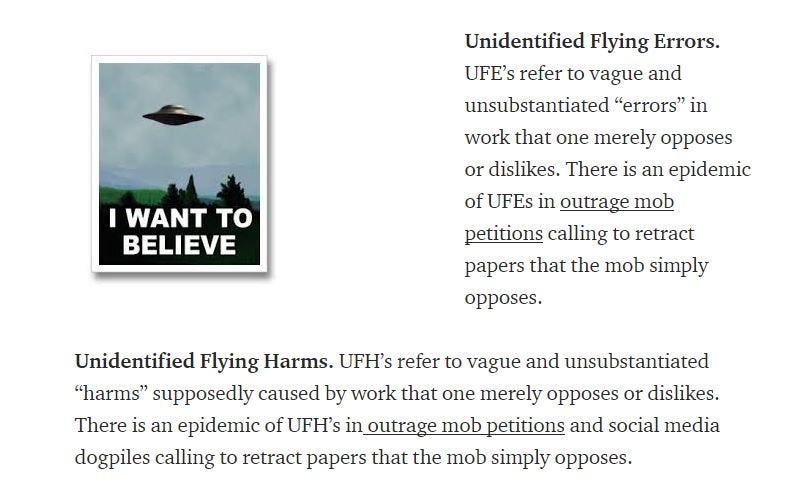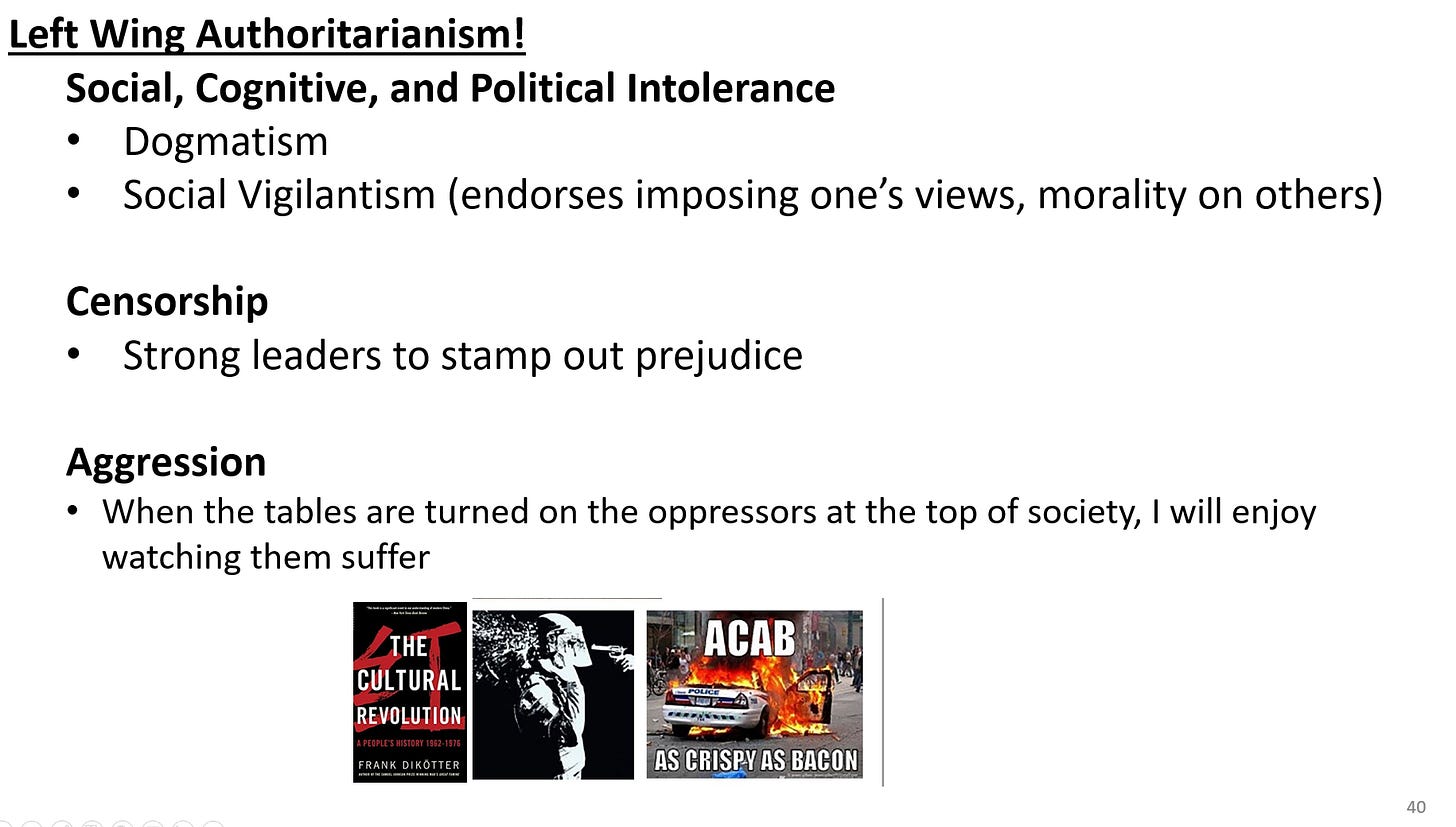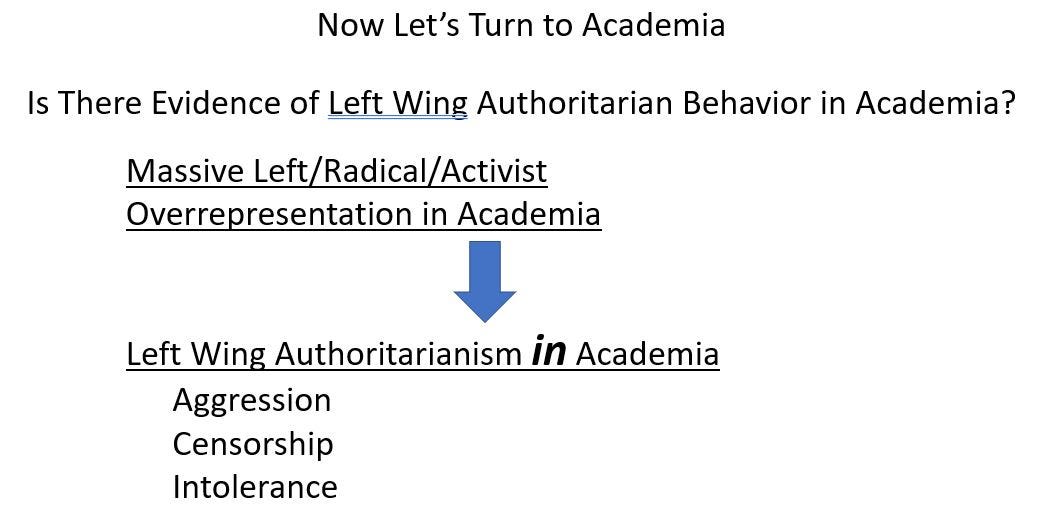Deconstructing APS's Inadequate Explanations for Firing Fiedler
A Case of Unidentified Flying Harms and Errors

Overview
If you are, say, new to this controversy, start here to get the big picture. In short, an outrage mob lobbied a major psychology professional organization (The Association for Psychological Science, APS) to fire the editor of one of its journals (Perspectives on Psychological Science, aka PoPS), amidst charges of racism and editorial irregularities. In this entry, I “interrogate” the “justifications” APS has presented for the firing.
Why Should You Care?
Academia is one of the main knowledge production and dissemination institutions in the country. Its dysfunctions justifiably raise doubts about its credibility. The entire event reveals a slew of dysfunctions:
Public shaming by outrage mob.
Orwellian, Kafka-esque mechanisms for punishment.
Abandonment of basic liberal values, such as free speech, academic freedom, open discourse and debate, and due process in exchange for imposition of far left values by mobs.
Just how extremely ideological, sectarian and dogmatic academia has become.
How the “diversity” and “inclusion” rhetoric so common in academia manifests as denunciation, vindictiveness, censorship, abandonment of due process, and exclusion. ICYMI: The open letter signed by almost 1400 academics displayed all of this
denunciation: all of us (Fiedler and four authors) are smeared as racists
vindictiveness: Fiedler should be punished;
censorship: the duly accepted papers should “unaccepted”
abandonment of due process: The mob did not call for an investigation or a discussion; absent either Fiedler’s chance to defend himself or question his accusers, and absent even seeing the papers accused of “racism,” the mob called for his head.
exclusion: Challenging psychology’s diversity-related sacred cows is now a field of land mines, and who needs that? Put differently, absent credentials deemed impeccable by mobs of academic social justice activists, criticizing anything involved in diversity, equity, and inclusion comes at sufficient personal risk to discourage most from doing it.

It is no wonder that this debate, like so many others, will mostly take place outside of academia (as in this excellent NYTimes article critical of academic and other diversity initiatives by Jesse Singal), and solutions will probably be imposed from outside of academia (as they are currently being imposed by DeSantis in Florida).
In this spirit, whether or not you are an academic, it is, perhaps, worth understanding how the academic sausage is now being made, via this case study.
APS as Kangaroo Court: Excerpts from the 1/26 APS Letter, with My Commentary
The full APS email sent to all its members “explaining” how APS made their decision to oust Fiedler is presented here. Quotes here are presented in this regular font. My comments are presented in italics.
“Dear APS Member,
In recent weeks, we heard concerns from many individuals about the editorial practices at Perspectives on Psychological Science. We learned about additional questionable editorial decisions and practices at the journal under the previous Editor-in-Chief (EIC).”
Like what? Here are excerpts from Kafka’s The Trial, about a man arrested and never informed what he did wrong:
Police officers, as they arrest the main character, after being asked what law did he break: “Mind you, what we can do is make sure that the high officials we work for find out just what sort of person it is they’re going to arrest, and why he should be arrested, before they issue the warrant. There’s no mistake there. Our authorities as far as I know, and I only know the lowest grades, don’t go out looking for guilt among the public; it’s the guilt that draws them out…”
After declaring that APS made no judgments about Fiedler’s character (Fiedler addresses this in his email, so I will not), they state:
“Some people are concerned that the actions APS took were too quick to have been made with adequate deliberation and consideration of evidence. Although quick, this action was not undertaken lightly.”
There is no content here. APS continues:
“After the initial complaint was brought to APS’s attention, journal staff immediately gathered relevant materials for APS leadership to review. This review was conducted over the weekend following the complaint. Much of the evidence to consider was immediately available via the records kept in the journal’s online submission portal. The staff and leadership also consulted with the Publications Committee and heard from some editors of other APS journals.”
What did they hear from other editors? Can you imagine a Court declaring someone guilty, without declaring what they were guilty of? APS is not a court, but Fiedler, APS members, and indeed the entire field of scientific psychology (one can publish in PoPS without being a member of APS) and the wider public deserve answers to this question.
Kafka, The Trial, continues:
“Look at this, Willem (1 of the arresting officers), he [the accused] admits he doesn’t know the law and at the same time insists he’s innocent.” “You’re quite right, but we can’t get him to understand a thing,” said the other [arresting officer].
APS’s email Continued:
“Before any action was taken, the EIC (“Editor in Chief,” i.e., Fiedler) was contacted regarding the complaints and provided with a list of questions regarding his editorial actions. His response did not dispute the factual basis of any of the details included in the complaints.”
This appears to conflict with what Fiedler wrote here:
“The second, equally important reason was that APS, the organization who holds the PPS journal, never asked me for my version, and never engaged on what seems to be a self-evident rule of procedural justice, namely, to give the target of accusation a chance to reply and provide a counter statement – to be circulated in the same widespread channel as the accusations. Up to now, nobody asked for my version.”
The apparent contradiction is that whereas Fiedler says he was not asked for his version of events, APS says they did contact him. However, this contradiction is more apparent than real:
Fiedler’s email, above, resolves the apparent contradiction as follows: Whereas it is literally true that “the EIC [Fiedler] was contacted,” as stated by APS, it is also literally true that he was given only the opportunity to respond to a series of narrowly-tailored interrogation-type questions about specific facts, and was not asked for, or to explain, his actions, procedures, and policies.
In short, APS failed to identify anything that Fiedler did to deserve being ousted.
The finale of Kafka’s The Trial is this (K. is the defendant never informed of his crime):
But the hands of one of the gentleman were laid on K.'s throat, while the other pushed the knife deep into his heart and twisted it there, twice. As his eyesight failed, K. saw the two gentlemen cheek by cheek, close in front of his face, watching the result. "Like a dog!" he said, it was as if the shame of it should outlive him.
Here are, based on the public discourse around this, the things Fiedler might be judged “guilty” of:
Accepting Hommel’s article. It was a mix of a stand-alone piece advocating for a different view of diversity than Roberts advocated and a critique of Roberts et al (2020); go here for the full set of links to these papers. Accepting a critique as a stand-alone article is indeed unusual. But so what? There is literally no known APS ethical standard that this violates; plus, it was also plausibly viewed as a stand-alone article presenting a perspective on diversity quite different than Roberts’. This is clearly how Fiedler saw it.
Accepting three commentaries that sided with Hommel and were critical of Roberts. The charge is that this was “biased.” Fiedler claims he invited other commentaries, but was turned down; I have no reason to doubt this. Indeed, the public record shows he invited Roberts to comment on Hommel’s article, and Roberts turned him down! Fiedler could also have waited till he got someone more supportive of Roberts’ view, and I think this would have been of value. But so what? What makes this a firing offense? No single article, or exchange, inherently solves a controversy or ends a discussion. The solution to omitted perspectives is to keep discussing or publishing. That is (or was) presumably why the journal is called “Perspectives” on Psychological Science.
Worse, biases pervade the peer reviewed literature. For example, Nature recently published an entire issue on “decolonizing science” with no critical commentaries. The Nature article reviewed here made claims about discrimination based on a cartoon, a tweet, and an interpretation of a dream. Published articles by authors from prestigious institutions were routinely rejected when rewritten to be by authors from low status institutions. There is no such thing as an “unbiased” review process, because any combination of 2-3 reviewers will have limitations, biases, and blindspots. Getting stupid, annoying, picayune, tendentious, and ax-grinding reviews, and publishing biased scholarship, also is a normal part of the review process, and it happens to all of us. If we fired every editor that ever oversaw a biased review or acceptance process, there would be no editors left. The solution to bias is usually not to fire anyone, but to debate, debunk, and disconfirm. If you believe “bias” is a problem to be “solved” by firing, you just handed conservatives who gain political power moral license to fire vast swaths of academia.
This accusation plausibly reveals a not-very-hidden agenda on the part of APS and the mob. “Representation” in academia, does not mean “represented in proportion to some population benchmark.” It means “giving special benefits to people from groups seen as deserving them by the progressive left.” If population representation is what mattered, then having one article by Roberts and five by others constitutes overrepresentation of Black people in the discussion forum (1/6 is about 17% in the forum, whereas Black people are about 12-13% of the U.S. population and far lower if one includes the entire English-speaking world). But this was clearly not “adequate” for APS, thereby revealing either: 1. race based quotas (and the allegations of “racism!” “commentaries were by three white men!” give credence to this); or 2. ideological quotas (“social justice ideology must always be represented at least as strongly as perspectives criticizing it, in every forum!”).
Accepting three commentaries by senior White men. The mob was all over this and it was implicit in the open letter calling for APS to summarily execute a dismissal of Fiedler. Left here for your edification without further comment by me.
Not sending commentaries out for peer review. The mob was all over this. But this has been and still is a common practice at many journals that have a commentary feature, including the journal Fiedler edited. This can be viewed as “questionable” if typical procedures are viewed as “questionable” — which they may well be, but it is bizarre to fire someone without warning for adopting a common practice that was not previously prohibited.
Having Hommel “review” Roberts’ reply. Fiedler did have Hommel read and give him feedback on Roberts’ reply. Of course, Fiedler also asked Roberts to review Hommel’s original contribution. This seems better described as “even-handed treatment” than as “racism” or “editorial malfeasance.” There is no evidence that Hommel was treated as a reviewer or that any changes were requested of Roberts based on Fiedler’s consultation with Hommel. Fiedler did request that Roberts consider Hommel’s identification of what he considered factual inaccuraces, but Fiedler explicitly informed Roberts that he need not address them all. Asking Roberts to go through each and every one of Hommel’s points was reasonably considered a pain in the ass. However, there was no reason to think that Fiedler either presumed Hommel was correct or that Roberts had to make changes. The “no harm, no foul” rule applies here, as does the “publishing is usually a pain in the ass” norm. For what its worth, my collaborators and I just had a paper titled A Defense of Merit in Science accepted at The Journal of Controversial Ideas, after receiving ridiculous reviews at other journals — and if you do not believe that, consider this: The idea that the only academic outlet that would publish a defense of merit is a journal devoted to “controversial ideas” tells you everything you need to know about the far left politicalization of academia.
There were lots of emails between Roberts and Fiedler. There were. Roberts asked many questions. Fiedler answered them. Their purpose was to clarify the process and to encourage Roberts to provide a contribution. When did any of this become a firing problem?
Fiedler asked Roberts to remove his denunciation of my horse/mule metaphor because it was so obviously misguided. Fiedler was concerned it would make Roberts look malicious. Well, Fiedler was definitely “guilty” of misjudging that, was’t he?
Giving Hommel the “last word” by allowing him to reply to all the commentaries. This is normal procedure for a target article and commentaries.
Conclusion
Vague allegations of “values and ethics violations” are a well-known justification for censorship and purges. APS should identify what specific ethical guidelines, policies, or rules Fiedler violated. Until they do so, they can and will be credibly accused of illiberal practices, including censorship, vindictiveness, and engaging in an ideological purge.



